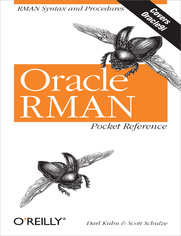Oracle RMAN Pocket Reference - Helion

ISBN: 978-05-965-5199-5
stron: 126, Format: ebook
Data wydania: 2001-11-01
Ksi─Ögarnia: Helion
Cena ksi─ů┼╝ki: 29,67 z┼é (poprzednio: 34,50 z┼é)
Oszczędzasz: 14% (-4,83 zł)
Oracle RMAN Pocket Reference is a handy guide for DBAs who intend to use Oracle Recovery Manager for database backup and recovery. Because Recovery Manager (RMAN) is a relatively new tool, many DBAs are just becoming familiar with it. They will welcome a timely book that explains clearly and concisely how to use RMAN for common backup and recovery tasks that are infrequent, yet extremely vital.The first portion of the book is primarily task-oriented. After a short section on RMAN architecture, the book shows (in checklist style) how to perform common backup and recovery tasks such as:
- Implementing a recovery catalog
- Creating and running RMAN scripts
- Configuring input/output channels
- Taking a full database backup
- Backing up tablespaces and datafiles
- Taking incremental backups
- Recovering lost datafiles
Osoby które kupowały "Oracle RMAN Pocket Reference", wybierały także:
- Oracle PL/SQL Programming. 4th Edition 199,33 zł, (29,90 zł -85%)
- Oracle PL/SQL Programming: A Developer's Workbook 166,11 zł, (29,90 zł -82%)
- Oracle PL/SQL for DBAs 135,91 zł, (29,90 zł -78%)
- Oracle Essentials. Oracle Database 11g. 4th Edition 124,58 zł, (29,90 zł -76%)
- Mastering Oracle SQL. 2nd Edition 124,58 zł, (29,90 zł -76%)
Spis tre┼Ťci
Oracle RMAN Pocket Reference eBook -- spis tre┼Ťci
- Oracle RMAN Pocket Reference
- SPECIAL OFFER: Upgrade this ebook with OReilly
- 1. Oracle RMANPocket Reference
- 1.1. Introduction
- 1.1.1. Acknowledgments
- 1.1.2. Caveats
- 1.1.3. Conventions
- 1.2. RMAN Architecture
- 1.2.1. RMAN Executable
- 1.2.2. Server Processes
- 1.2.3. Channels
- 1.2.4. Target Database
- 1.2.5. Recovery Catalog Database
- 1.2.6. Media Management Layer
- 1.2.7. Backups, Backup Sets, and Backup Pieces
- 1.3. Starting RMAN
- 1.3.1. Target Prerequisites
- 1.3.2. Invoking the RMAN Executable
- 1.3.3. Connecting to a Target with No Catalog
- 1.3.3.1. O/S authentication
- 1.3.3.2. Password file authentication
- 1.3.3.3. Hiding the password
- 1.3.4. Connecting to Both a Target and a Catalog
- 1.3.4.1. O/S authentication
- 1.3.4.2. Password authentication
- 1.4. Executing Commands
- 1.4.1. Executing RMAN Commandsfrom the RMAN Prompt
- 1.4.2. Executing RMAN Commands from a File
- 1.4.3. Running SQL and O/S Commandsfrom Within RMAN
- 1.4.4. Running RMAN from Shell Scripts
- 1.4.4.1. Shell basics
- 1.4.4.2. Passing parameters to RMAN
- 1.5. Implementing a Catalog
- 1.5.1. What Is the Catalog?
- 1.5.1.1. Catalog advantages
- 1.5.1.2. Catalog disadvantages
- 1.5.1.3. Using RMAN without a catalog
- 1.5.2. Catalog Backup Strategies
- 1.5.2.1. Full export
- 1.5.2.2. Cold backup
- 1.5.2.3. Hot backup
- 1.5.2.4. RMAN backup
- 1.5.2.5. Hot standby
- 1.5.2.6. Recreating a catalog
- 1.5.3. Catalog Issues
- 1.5.3.1. Physical location of the catalog
- 1.5.3.2. Version of catalog
- 1.5.3.3. Sizing the catalog
- 1.5.3.4. Managing multiple target databases
- 1.5.4. Creating a Catalog
- 1.5.5. Registering a Target Database
- 1.5.1. What Is the Catalog?
- 1.6. Stored Catalog Scripts
- 1.6.1. Storing a Script
- 1.6.2. Executing a Stored Script
- 1.6.3. Viewing a Stored Script
- 1.6.4. Deleting a Stored Script
- 1.7. Backups
- 1.7.1. Full Database Offline Backup
- 1.7.2. Full Database Online Backup
- 1.7.3. Backing Up a Tablespace
- 1.7.4. Backing Up a Datafile
- 1.7.5. Backing Up Control Files
- 1.7.6. Backing Up Archived Redo Log Files
- 1.7.7. Incremental Backups
- 1.7.8. Backup Tips
- 1.7.8.1. Validating backups
- 1.7.8.2. Configuring channels
- 1.7.8.3. Parallelism of backups
- 1.7.8.4. Tagging a backup
- 1.8. Restoring Files
- 1.8.1. Restoring and Recovering All Datafiles
- 1.8.2. Restoring Specific Tablespaces/Datafiles
- 1.8.3. Restoring Read-Only Tablespaces
- 1.8.4. Point-in-Time Recovery
- 1.8.5. Restoring Control Files
- 1.8.6. Restoring Archived Redo Log Files
- 1.9. RMAN Command Reference
- 1.9.1. Common Keywords
- 1.9.2. Common Clauses
- 1.9.3. Command-Line Syntax
- 1.9.3.1. Oracle9i syntax
- 1.9.3.2. Oracle8i syntax
- 1.9.3.3. Keywords
- @
- @@
- ALLOCATE CHANNEL
- ALLOCATE CHANNEL FOR MAINTENANCE
- allocOperand
- ALTER DATABASE
- archivelogRecordSpecifier
- BACKUP
- BLOCKRECOVER (Oracle9i only)
- CATALOG
- CHANGE
- completedTimeSpec
- CONFIGURE (Oracle9i only)
- CONNECT
- connectStringSpec
- COPY
- CREATE CATALOG
- CREATE SCRIPT
- CROSSCHECK
- datafileSpec
- DELETE
- DELETE SCRIPT
- deviceSpecifier
- DROP CATALOG
- DUPLICATE
- EXECUTE SCRIPT
- EXIT
- HOST
- keepOption (Oracle9i only)
- LIST
- listObj
- mntQualifer (Oracle9i only)
- obsoleteOpersList (Oracle9i only)
- PRINT SCRIPT
- QUIT (Oracle9i only)
- RecordSpec (Oracle9i only)
- RECOVER
- REGISTER
- RELEASE CHANNEL
- releaseForMaint
- REPLACE SCRIPT
- REPLICATE
- REPORT
- RESET DATABASE
- RESTORE
- RESYNC
- RUN
- SEND
- SET
- SHOW (Oracle9i only)
- SHUTDOWN
- SPOOL (Oracle9i only)
- SQL
- STARTUP
- SWITCH
- untilClause
- UPGRADE CATALOG
- VALIDATE
- 1.1. Introduction
- About the Authors
- SPECIAL OFFER: Upgrade this ebook with OReilly





